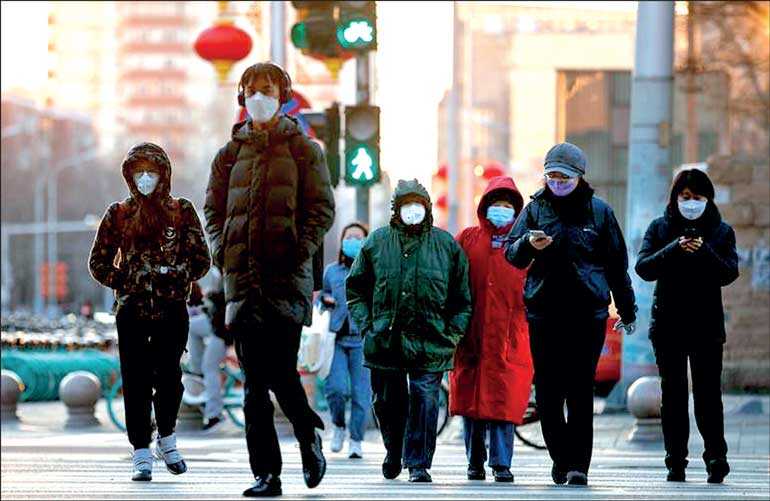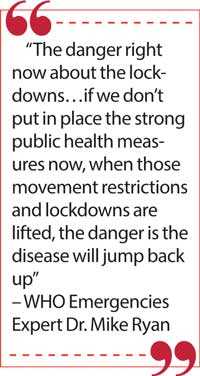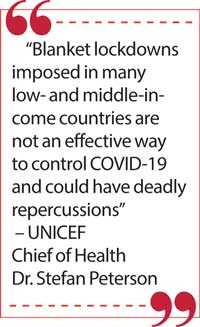Thursday Feb 19, 2026
Thursday Feb 19, 2026
Monday, 18 May 2020 00:00 - - {{hitsCtrl.values.hits}}

I write this on the cusp of another impending ‘island-wide curfew’ on Sunday (17 May)! My heartbeat quickens, I am overtaken by a frisson of glee… oh, to be fully “curfew-ed”, however briefly, once more!
I jest, because I cannot fathom what we’re doing, or why now, with day after day of reporting that new cases are overwhelmingly from the Navy cluster, with relative calm in Colombo and Gampaha over the last several, ‘quasi-curfew-ed’ days, we are celebrating with a fresh curfew!
Of course, nothing need be explained, ‘locking people’ up on a whim seems to be a new national reflex. Or if it’s not a whim but carefully considered policy, surely a democratic society is entitled to hear on what basis their liberty is being curtailed this time?
It is not for health reasons, as nothing has changed on that front. And if every such declaration has one clicking one’s heels and saluting in compliance, then indeed curfew-ing as a new national hobby may be just the thing.
WHO spills the beans
WHO’s top Emergencies Expert Dr. Mike Ryan, back on 22 March, said these wise and curiously little-quoted and even less-attended words: “Countries can’t simply lock down their societies to defeat coronavirus.”
He continued: “What we really need to focus on is finding those who are sick, those who have the virus, isolate them, and find their contacts and isolate them.”
Sounds just like Dr. David Katz at Yale University, recommending vertical interdiction!
And Dr. Ryan concluded: “The danger right now about the lockdowns…if we don’t put in place the strong public health measures now, when those movement restrictions and lockdowns are lifted, the danger is the disease will jump back up.”
Note, this relates to ‘lockdown’, not curfew, much less curfew for longer than Wuhan was economically shut down. WHO has never advocated ‘curfew’.
A few weeks back, Dr. Ryan said we all had much to learn from Sweden, and that since we cannot be indefinitely ‘locked down’ (much less under curfew), Sweden might well provide a workable model for us all going forward – even with adaptations.
And just a few days back, Dr. Ryan spoke up again, pointing out that COVID-19 was not going to go away, and even if there were a vaccine, like TB, it may still be around. He said that it will be another pandemic virus we cope with, and like HIV, we will need to learn to live with it.
Having learned this is not the bubonic plague stalking the earth, with extremely low fatalities, particularly when factoring in those who have been infected and are asymptomatic or have recovered, Dr. Ryan’s counsel should be well-heeded before another day goes by, certainly before we keep putting clamps on normal functioning and a fighting chance at economic recovery.
The psychological issue
By continuing with overnight curfews or never-ending curfews or reinstated curfews, we are aggravating the ‘mental despair’ the UN has recently warned about being a concern. They said this was particularly relevant where mental health facilities are not widely available or such treatment is not as readily part of the cultural fabric of a society.
People ‘locked down’ for a long time lose their edge, they retreat into a mental or emotional shell; they get more risk-averse, they are more prone to avoid challenges, further shocks or uncertainties. Do we think we can ‘order’ everyone to return to the economic front lines in full fighting trim? We can, but it will require psychological and emotional navigation to do so.
I worked on trauma relief for KLM and Ceylinco, among others, after the Central Bank bombing in the 90’s. With the bomb, it was clear people were ‘shocked’, and needed help to regain a sense of normalcy, heal, and rebuild emotional balance and more.
Well, this time, people seeing their entire economy teetering, everything normal in the world destabilised, ordered indoors with no end in sight, hearing no strategy stated, powerless and despairing, will need help, too. But we can’t give it to them if we never fully move forward to a next milestone.
“Go to work, buy groceries and medicine, and come home” does not sound like a society nor does it seem a balanced and sane requirement when you have nine deaths and 600 of your cases coming from the Navy and armed services and one super-spreader who came back from India and led to about 90 cases – in other words, there is no wide-scale transmission. People can’t figure out, therefore, why any of that means that they should be locked up. 
Whatever the justification, we need to provide support and help, or else rather than an economic rebound, we will have people awaiting the next surge for the next curfew, or pulling back at the whiff of the next lockdown, or perpetually on guard for an economic tsunami that’s been gathering force to hit.
We must state some definitive strategy, provide some reliable guidelines and thresholds as virtually every country in the world does. So, after the infected person made a tour of South Korea’s nightclubs recently, leading to a temporary spike in cases, the South Koreans were quite calm, saying “less than 50 new cases a day” on a regular basis is what they look to; less than 5% growth of new cases other exemplars have said in their circuit breaker models, except for occasional isolated clusters. We, too, can establish something evidence-based and applicable in light of Dr. Ryan’s comments and what we know of viruses per se (they don’t usually just ‘disappear’).
And then, we should urge employers to not ‘shame’ people into pretending, out of fear of losing their jobs, that they are normal, or to be wary of accepting they may need some support. Suppression works with viruses, perhaps, not with emotions or psyches. In the field of counselling we hear, “You cannot change something until you first accept it.”
UNICEF joins in
UNICEF Chief of Health Dr. Stefan Peterson said: “Blanket lockdowns imposed in many low- and middle-income countries are not an effective way to control COVID-19 and could have deadly repercussions.”
He said the collateral impact “far outweighs any threat presented by the coronavirus”.
He went on to say: “I’m concerned that lockdown measures have been copied between countries for lack of knowing what to do, rarely with any contextualisation for the local situation.”
Almost 1.2 million children could die in the next six months due to disruption of health services and food supplies brought on by the pandemic, and made worse by measures that keep people from leaving their homes and being able to access essential health care services, he suggested. He also warned of the dire economic impact and the potential for skyrocketing poverty if things remain shut down.
He said: “One size fits no one. The objective is to slow the virus, not to lockdown people. We need to lift our eyes and look at the total picture of public health.”
Dr. Peterson urged countries not to go for draconian lockdowns but to focus on identifying hotspots (based on evidence not ‘population density’ paranoia) so that regional or geographical restrictions less damaging for public health can be introduced.
Just for anyone reading who can influence our policy to whom ‘data’ is not a dirty word, the US has 4% of the world population and roughly 25% of the reported deaths (depending on how you count). Philippines, with a less impressive healthcare system and more variable ‘lockdowns’, had 20 times less deaths per capita. Taiwan has 24 million people, 7 deaths, 0.3 per million, no lockdowns, and a functioning economy which grew in the first quarter of 2020! 
Belgium and Sweden, same population, both with issues with nursing home deaths. Sweden’s deaths are roughly 322 per million with very mild largely voluntary lockdown; Belgium’s, with an extremely strict lockdown, 751 per million.
Japan, with a functioning economy throughout, focused short-term restrictions only, and death rate is 5 per million; Iceland, no lockdown, 29 per million COVID-19 deaths; Ethiopia, no lockdown, fatalities were 0.04 per million; Vietnam, targeted brief lockdowns, 0 fatalities.
If ‘lockdown’ were the panacea, the above should not be possible. Most of these countries did use medical prudence, hygiene practices, reasonable distancing, and wearing of masks for some time. Here in Sri Lanka, despite total curfew, we have more deaths currently than Vietnam, Taiwan and Hong Kong. Yet we have one of the smallest death rates in the world and we are punishing ourselves by the worst varietal of ‘lockdown’. Why? Again, our numbers have been consistent throughout, pre- and during curfew, until the recent cluster.
We can be grateful and proud of our relatively mild numbers, but let’s stop fretting about caseload and pay attention to ‘lives’ through the lens of economy and society and resilience as well, to be able to generate a purposeful, productive and hopefully once more prosperous future.
Nature requires us to adapt. We cannot conquer her, we cannot browbeat her, and we cannot ‘play’ her. We cannot ‘ban’ pandemics, we have to ‘ban’ our hubris in thinking that we can impose our will over nature’s playbook. We can mitigate, we can manage, we can try to inoculate, we must leverage the genius of our immune systems, we can become more robust, we can work around, and we can work with, but we must defer in the end to having to decide our trade-offs and agreeing what is and is not worth doing to be ‘safe’.
And perhaps we can all take wisdom from a group of German experts who published a report assessing their own country’s approach, which has been lauded overall. The report regards the panic over coronavirus as a false alarm and identifies the absence of an adequate feedback loop as the reason the over-reaction wasn’t corrected: “A major reason for the false alarm remaining undiscovered for weeks was that the framework governing the handling by the crisis team, and the wider general management of a pandemic, did not include any processes designed to detect changes in data that might point either to a false alarm, or to the threat of collateral damage – in particular where that involves a threat to life and living – becoming greater than the risk to health and lives posed by the virus.”
We are overdue for some course correction and recalibration given what we know now and where we are, and the urgent need to fully focus on economic revitalisation. We can all applaud the positive indicators from the President in this regard.
If we accept WHO’s assessment that the virus is going to be with us for some time; if we accept all the serological tests that tell us this coronavirus has been circulating since the fall and many times the number of people have had it than we know, which brings the fatality rate even farther down; if we acknowledge the psychological impact that the UN warns of and are willing to respond to it with compassion – and if we acknowledge the public health issues raised by UNICEF, and the economic meltdown to key strategic sectors here – surely we must now create and commit to a path, without delay, without qualification, to creating the future.